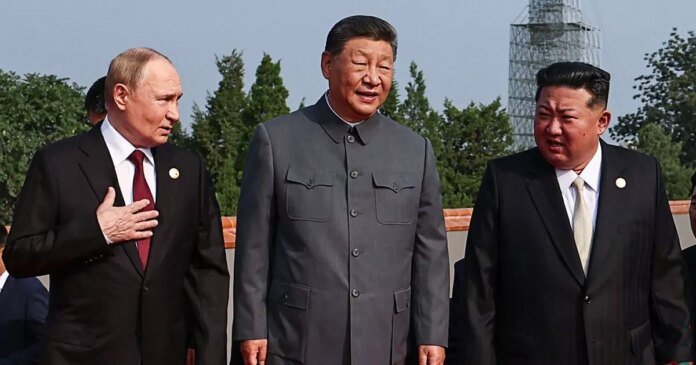China’s recent military parade showcased more than just its historical sacrifices during World War II. The event was a grand demonstration of strength, featuring precise marching, advanced weaponry like missiles and new armored vehicles, sending a clear message of unity and power.
The parade also symbolized a show of solidarity among leaders like North Korea’s Kim Jong-un and Russia’s Vladimir Putin, aimed at challenging the dominance of the US and western powers, particularly in response to economic pressures led by the Trump administration. The display of military might by thousands of troops and sophisticated equipment was a bold statement that cannot be ignored.
During the event, Putin referred to Xi as a “dear friend,” emphasizing the strong strategic ties between China and Russia. This diplomatic gesture was intended to assert the growing influence of China, Russia, and their allies while subtly undermining the US and its leadership.
The gathering of Xi, Putin, and Kim at the ceremony signified a significant shift in global alliances, with China positioning itself as a key player in the eastern military and economic realm. The trio’s increasing closeness indicated a strategic realignment that could challenge the existing world order, particularly in the face of US opposition.
The notable absence of Trump at the event did not go unnoticed, as he expressed his discontent over social media, highlighting the perceived snub by the other leaders. The meeting of the Russian, Chinese, and North Korean leaders was interpreted by experts as a pivotal moment signaling a potential shift in power dynamics and geopolitical strategies.
Xi’s remarks about the choice between peace and war, dialogue and confrontation, and China’s firm stance in global affairs conveyed a clear message of determination and resolve. China’s historical contributions in World War II were also emphasized, serving as a reminder of its past sacrifices and resilience.
While Kim Jong-un’s presence added a symbolic dimension to the gathering, Putin emerged as a prominent figure, leveraging his ties with China to bolster his influence on the world stage. The strategic partnerships and military collaborations between Russia, China, and North Korea hinted at a recalibration of power dynamics in global politics.
As tensions simmered and alliances shifted, the event underscored the evolving geopolitical landscape, with China’s ambitions to challenge the US both militarily and economically taking center stage. The display of unity among the three leaders hinted at a new chapter in international relations, with potential implications for regional stability and global power dynamics.
